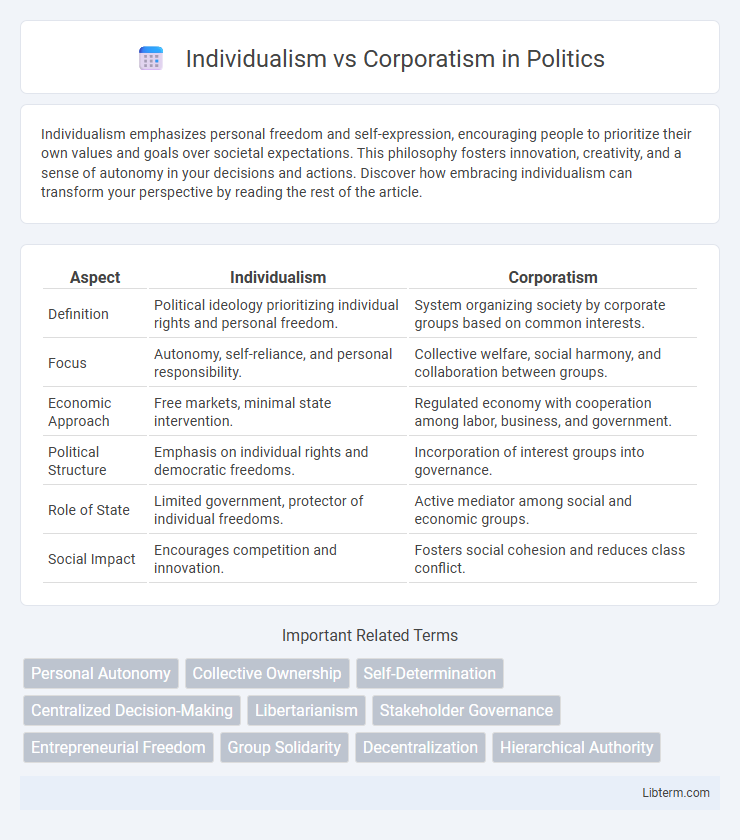Individualism emphasizes personal freedom and self-expression, encouraging people to prioritize their own values and goals over societal expectations. This philosophy fosters innovation, creativity, and a sense of autonomy in your decisions and actions. Discover how embracing individualism can transform your perspective by reading the rest of the article.
Table of Comparison
| Aspect | Individualism | Corporatism |
|---|---|---|
| Definition | Political ideology prioritizing individual rights and personal freedom. | System organizing society by corporate groups based on common interests. |
| Focus | Autonomy, self-reliance, and personal responsibility. | Collective welfare, social harmony, and collaboration between groups. |
| Economic Approach | Free markets, minimal state intervention. | Regulated economy with cooperation among labor, business, and government. |
| Political Structure | Emphasis on individual rights and democratic freedoms. | Incorporation of interest groups into governance. |
| Role of State | Limited government, protector of individual freedoms. | Active mediator among social and economic groups. |
| Social Impact | Encourages competition and innovation. | Fosters social cohesion and reduces class conflict. |
Understanding Individualism: Core Principles
Individualism emphasizes personal autonomy, self-reliance, and the inherent value of each individual, prioritizing individual rights and freedoms over collective control. This principle supports the belief that individuals are best equipped to make decisions for themselves without excessive interference from governments or organizations. It fosters innovation, diversity of thought, and personal responsibility as foundational elements in social and economic systems.
Defining Corporatism: Key Concepts
Corporatism is a socio-political system characterized by the organization of society into corporate groups such as agricultural, labor, military, or scientific sectors, which collectively negotiate and collaborate with the state to shape public policy. This model emphasizes the role of collective entities and shared interests over individual autonomy, promoting structured cooperation between organized interest groups and government authorities to maintain social order and economic stability. Central concepts include tripartism, where representatives of workers, employers, and the state engage in dialogue, and the integration of professional associations into governance frameworks to harmonize relations between society and the state.
Historical Roots: Evolution of Both Ideologies
Individualism traces back to Enlightenment thinkers like John Locke, emphasizing personal liberty and self-reliance as foundations of modern democratic societies. Corporatism emerged during the late 19th and early 20th centuries, influenced by Catholic social teaching and industrial-era social conflicts, advocating for organized group representation and collaboration between labor, business, and government. The evolution of these ideologies reflects contrasting approaches to social organization, with individualism prioritizing personal autonomy and corporatism focusing on collective interests and structured cooperation.
Individual Rights vs Collective Interests
Individualism emphasizes the protection and promotion of individual rights, prioritizing personal freedom, autonomy, and self-expression as fundamental to human dignity. Corporatism, in contrast, stresses collective interests, advocating for social organization through groups or corporations that coordinate economic and political activities to achieve common goals and social cohesion. The tension between individual rights and collective interests highlights the balance societies must navigate between personal liberties and the welfare or stability of the broader community.
Economic Impacts: Free Markets vs Centralized Control
Individualism promotes free markets by encouraging entrepreneurship, innovation, and competition, leading to greater economic efficiency and consumer choice. Corporatism relies on centralized control and collaboration between government and major economic stakeholders, potentially stabilizing markets but risking reduced competition and slower innovation. The economic impact varies as free markets accelerate growth and adaptability, while corporatism may prioritize stability and long-term planning at the cost of flexibility.
Social Structures: Autonomy vs Group Identity
Individualism emphasizes personal autonomy, prioritizing self-reliance and independent decision-making within social structures. Corporatism values group identity, promoting collective responsibility and integration of individuals into organized social units such as corporations, unions, or governmental bodies. The contrast lies in individualism fostering personal freedom versus corporatism emphasizing cohesion and shared goals within groups.
Political Systems: Democracy, Authoritarianism, and Beyond
Individualism emphasizes personal autonomy and limited government intervention, characteristic of liberal democracies that protect individual rights and promote pluralism. Corporatism prioritizes collective interests through structured collaboration between state, business, and labor, often seen in authoritarian regimes that maintain control via organized groups. Hybrid political systems blend elements of democracy and corporatism, balancing individual freedoms with coordinated social and economic governance.
Cultural Perspectives: Influence on Values and Behaviors
Individualism emphasizes personal autonomy, self-expression, and individual rights, influencing cultures to prioritize independence and personal achievement. Corporatism fosters collective responsibility, social cohesion, and group-oriented values, encouraging behaviors that support community welfare and organizational loyalty. These contrasting cultural perspectives shape decision-making processes, communication styles, and social norms within societies.
Modern Examples: Case Studies in Practice
Modern examples of individualism vs corporatism can be seen in Silicon Valley tech startups prioritizing innovation and personal ownership versus large corporations like Amazon implementing structured hierarchies and collective labor goals. Case studies in Denmark reveal a strong corporatist model where government, employers, and unions collaborate on economic policies, contrasting with the United States' emphasis on individual entrepreneurship and market-driven growth. These real-world examples highlight how diverse socio-economic frameworks impact innovation, labor relations, and economic resilience.
The Future of Governance: Balancing Individualism and Corporatism
The future of governance hinges on striking a balance between individualism, which champions personal freedom and autonomy, and corporatism, emphasizing collective responsibility and institutional cooperation. Emerging models integrate decentralized decision-making with collaborative frameworks, promoting innovation while ensuring social equity. Effective governance will depend on adaptive policies that reconcile individual rights with the benefits of organized, corporate structures.
Individualism Infographic

 libterm.com
libterm.com